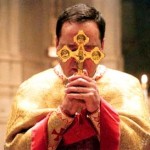 by Humbert of Romans
by Humbert of Romans
CHAPTER ONE
VI. Difficulties of the Office of Preacher: Part One
We shall now consider the peculiar difficulties of preaching, and we shall show, by three proofs, that it is not an easy task to proclaim the word of God successfully.
The first proof is found in the rarity of good preachers. In the early days of the Church a small number of Apostles, trained for their particular mission, was enough to convert the entire world; but present day preachers, in spite of their number, make only mediocre gains. Why? Because the first preachers were equal to their mission, whereas those following in their footsteps are not. For, to judge the difficulty of an art, one need only count the number of workers engaged in it then note how few there are who really attain perfection in it.
Secondly, the inefficiency of many in carrying out the ministry. All have seen, and, indeed, still frequently see, very learned priests who, in spite of serious application to the task, have never been able to attain success in preaching. But this, too, bears out our conviction that preaching is not easy, since another proof of the difficulty of an art is the inability of those to master it who are evidently skilled in other fields.
The last proof is the necessity of external help which is required for worth-while preaching. It is a fact that, by possessing one habit, which results from the repetition of an act, we, at the same time, acquire a certain ease in other arts, according to the popular maxim:
“It is by forging that one becomes a blacksmith,”
or, to use another, it is by repeated playing on his instrument that a harpist becomes master of it. But the gift of a preacher is quite different. His virtue is a special gift which only God can grant:
“The power of the earth is in the hand of God” (Ecclus. 10:4),
by which is meant, according to the gloss, the power of the preacher. This is a sound observation because the power of God alone can communicate to man the ability to preach the Divine Mysteries fruitfully. And this is a further confirmation of our original statement, for that which cannot be acquired by one’s own work, but must be received from another, is definitely the rarest and most difficult of possessions.
What, then, are some of the reasons why this phase of the ministry is so hard to master?
In the first place, one can easily find teachers for any other subject, but for preaching there is only one, the Holy Spirit, Whose grace very few receive abundantly. That is the reason why Christ did not want the Apostles, who were to become excellent preachers, to begin the conversion of the world before the Holy Spirit descended upon them and taught them all things. Having received this gift, however, they
“. . . began to speak in foreign tongues, even as the Holy Spirit prompted them to speak” (Acts 2:4).
Another reason has to do with the instrument of the ministry, i.e., language, which can easily lead one astray (even in the simple Christian life), when God does not direct it. The Book of Proverbs wisely informs us:
“It is the part of the Lord to govern the tongue” (Prov. 16:1).
Just as it is more awkward to help ourselves with the left hand, which easily entangles us, than with the more competent right hand, so the language used in the arduous task of preaching is more liable to failure than when the same speech is employed for our ordinary duties.
The third reason takes up the conditions needed for good preaching. They are numerous and will be seen more clearly in the following chapter. It is evident that any work is more arduous according as it demands the concurrence of many conditions. For example, a painter has more trouble in producing a sketch than in painting one that needs just a few shades. Thus, by this principle, we find many difficulties in preaching because of the great number of qualifications it demands.
Notice, also, that we praise a person who does something only on the condition that he do it well:
“learn to do well” (Isaiah 1:17),
urges Isaiah. This is not easy when it is a question of preaching.
Hence, the preacher must strive with all his might to do justice to such a difficult and perfect ministry. Three things will contribute to his success: application to his work; a knowledge of the method used by other preachers; prayer addressed to God.
About the first point, observe that, granted the grace of preaching well is a special gift of God, nevertheless it demands from the preacher full application to the study of whatever is needed for the proper execution of his office. That is why the gloss insists that every preacher, in imitation of the Apostles, should realize what was meant in Heaven when
“. . . the seven angels, who had the seven trumpets, prepared themselves to sound the trumpet” (Rev. 8:6).
And in another place the gloss declares that the words of Christ to His Apostles:
“ . . . be not anxious how our what you are to speak” (Matt. 10:19)
refer only to those chosen ones, in virtue of the privilege of their special vocation so that those who are not so privileged must prepare themselves. Moreover, St. Jerome, while explaining the text of the Prophet, Ezekiel,
“Eat this book” (Ezek. 3:1),
points out that the preacher must nourish his heart with the words of God and must meditate attentively on them before delivering them to the people.
Some preachers use to many subtleties in their discourse for the sake of elegance. At one time they seek those novelties which the Athenians delighted in; at another time they produce arguments drawn from philosophy which, they imagine, improve their speech. On the contrary, good preachers study principally what is useful and, building their sermons on this, they exclude what is less profitable. St. Paul did that, and so he could say,
“You know from the first day that I came into Asia how I have kept back nothing that was profitable to you” (Acts 20:18,20).
Many preachers have a predilection for words, repeating beyond measure, now the parts of the sermon, again the distinctions or the authorities; giving reasons or examples, or words that express one and the same thing, repeating continually; at all times being far too prolix. These are some of the defects which vitiate a discourse, and they must be avoided. For if a moderate rain makes crops grow well, an extremely heavy rain will flood the field; and, as in the Divine Office, brevity fosters devotion, while a long office engenders sleepiness, so too, preaching, when it is succinct, is useful; when prolonged to excess it becomes useless and tiresome. Also, a good preacher, if he is prudent, will see to it that he does not say many things, and will say them in few words; and if he observes that he has prepared too much matter, he will lay aside whatever is irrelevant, and give to his starved audience bread, a necessary and substantial food, which will be beneficial to them. He also imitates the wise steward whom St. Luke (Luke 12:42) represents to us, and who prudently sees to it that he does not use up at one time all the wheat that he can dispose of.
Other preachers, to support their teaching, use exclusively examples or arguments, or authority; but to combine three is far better, for, where one fails, another will succeed. The combination will form
“a threefold cord,” with a fishhook attached, and which “is not easily broken by the fish” (Eccles. 4:12).
In conclusion we shall say that every good preacher, in the composition of a sermon, should first be practical, like a host who prepares food of good quality for his guests. Secondly, he should use moderation, even in practical things; for everything found in a grocery store cannot be used by a host. And thirdly, he should use words which are convincing, just as at a banquet guests are served not only food of good quality, but also food that is well prepared and pleasing to the palate.
![]()
This is an excerpt from the Preachers Institute publication:

